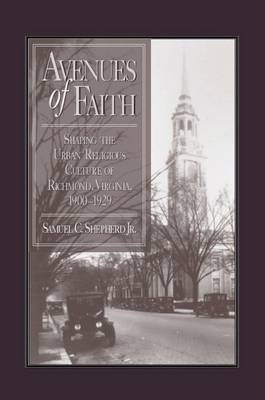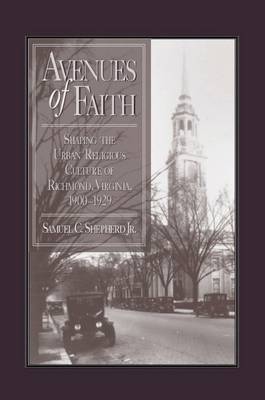
- Retrait gratuit dans votre magasin Club
- 7.000.000 titres dans notre catalogue
- Payer en toute sécurité
- Toujours un magasin près de chez vous
- Retrait gratuit dans votre magasin Club
- 7.000.000 titres dans notre catalogue
- Payer en toute sécurité
- Toujours un magasin près de chez vous
Avenues of Faith
Shaping the Urban Religious Culture of Richmond, Virginia, 1900-1929
Samuel C Shepherd Jr
66,45 €
+ 132 points
Format
Description
The first thorough study of organized mainline churches in a major southern American city during the early 20th century Avenues of Faith documents how religion flourished in southern cities after the turn of the century and how a cadre of clergy and laity created a notably progressive religious culture in Richmond, the bastion of the Old South. Famous as the former capital of the Confederacy, Richmond emerges as a dynamic and growing industrial city invigorated by the social activism of its Protestants. By examining six mainline white denominations-Episcopalians, Methodists, Presbyterians, Baptists, Disciples of Christ, and Lutherans, Samuel C. Shepherd Jr. emphasizes the extent to which the city fostered religious diversity, even as "blind spots" remained regarding Catholics, African Americans, Mormons, and Jews. Shepherd explores such topics as evangelism, interdenominational cooperation, the temperance campaign, the Sunday school movement, the international peace initiatives, and the expanding role of lay people of both sexes. He also notes the community's widespread rejection of fundamentalism, a religious phenomenon almost automatically associated with the South, and shows how it nurtured social reform to combat a host of urban problems associated with public health, education, housing, women's suffrage, prohibition, children, and prisons. In lucid prose and with excellent use of primary sources, Shepherd delivers a fresh portrait of Richmond Protestants who embraced change and transformed their community, making it an active, progressive religious center of the New South.
Spécifications
Parties prenantes
- Auteur(s) :
- Editeur:
Contenu
- Nombre de pages :
- 432
- Langue:
- Anglais
- Collection :
Caractéristiques
- EAN:
- 9780817310769
- Date de parution :
- 15-05-01
- Format:
- Livre relié
- Format numérique:
- Genaaid
- Dimensions :
- 164 mm x 244 mm
- Poids :
- 889 g







